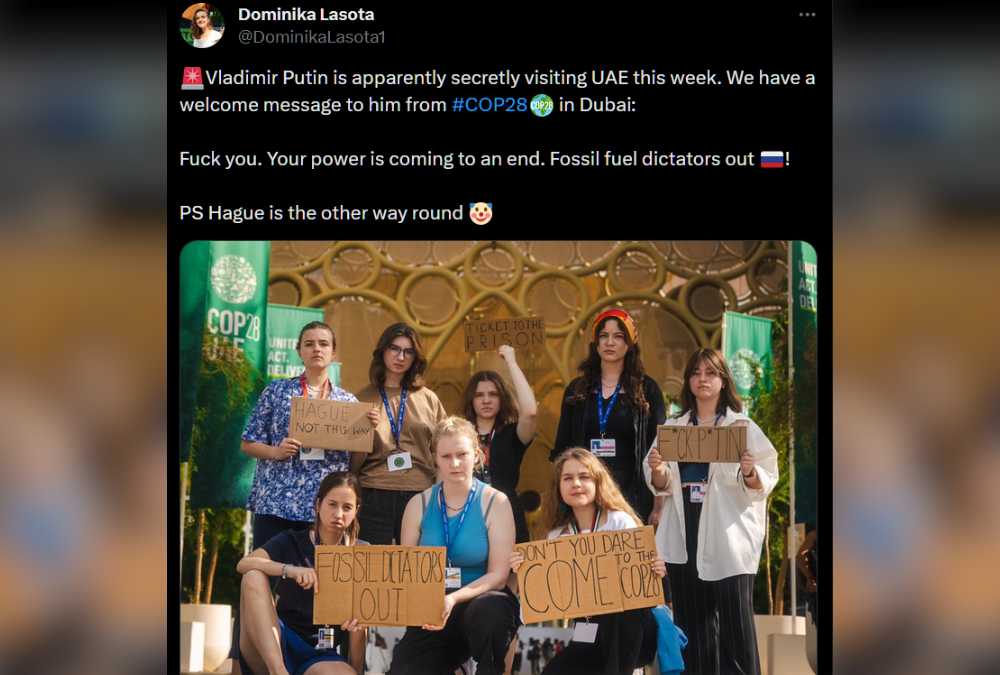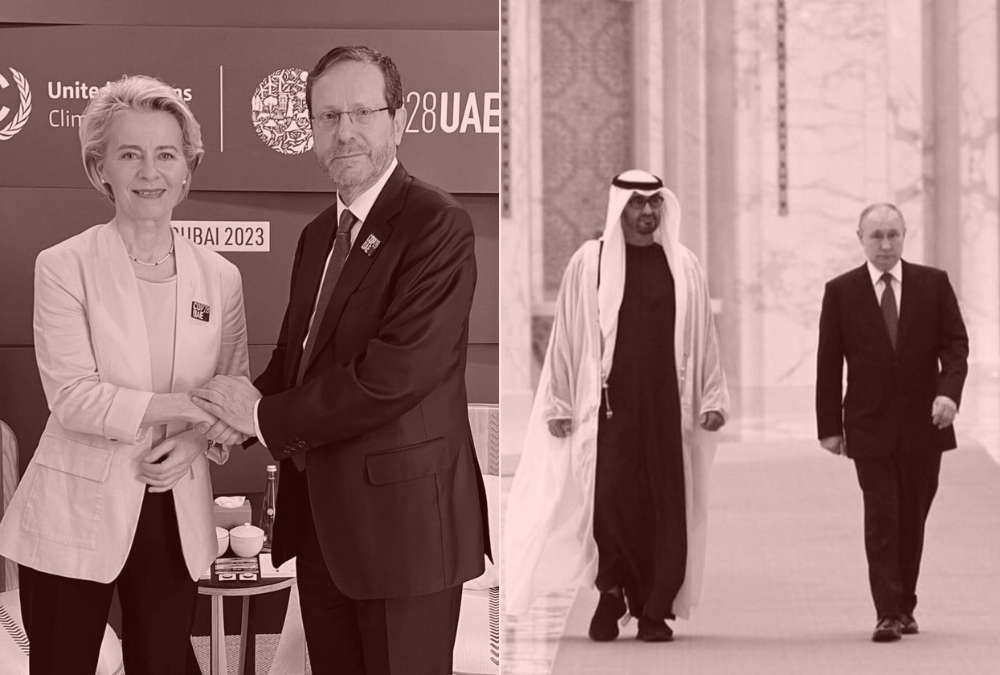One of the standout features of this year’s COP28 was the fact that protests calling for the end of the Israeli state’s ongoing genocide in Palestine were happening on the conference’s doorstep practically every day.
COP28 was already one of the most crucial climate summits ever held to begin with due to the increasingly evident impact of climate change across the world. As has been already pointed out by this website from day one, COP28 must end with unequivocal commitments to a permanent phase-out of fossil fuels to be considered a success, and the fossil fuel industry’s resistance to this inalienable fact has been tremendous.
Yesterday, the spectre of war himself, beleaguered Russian president Vladimir Putin, showed up at the Emirati state in a surprise visit that has rattled Kyiv’s representatives at the summit. In true dictator fashion, the host country spared no expense in giving Putin a slimy, warm welcome, complete with jets colouring the sky with the Russian flag’s white, blue, and red. When birds of a feather flock together, one must celebrate accordingly.
If you’re wondering how come Putin wasn’t immediately arrested and trialed at The International Criminal Court in the Hague the minute he set foot on UAE territory, it’s because it is one of the few wealthy countries in the world which is not a signatory of the legislative act that endows the court with its powers to prosecute war criminals.
Needless to say, activists and protesters who are present at the summit extended their own kind of welcome towards Putin.

One thing that keen observers have picked up on from COP28 is just how fraught the global power hierarchy is at the moment. It is faced with two overwhelmingly dire realities that cannot be dealt with through the traditional political frameworks which have failed us – the existential threat of climate change and the unsustainable, destructive problems caused by long, drawn out conflicts.
The Russian invasion of Ukraine and the escalation of the genocide in Palestine have all but depleted Western weaponry stocks, led to tensions in key decision-making bodies like the US Congress, the European Union, and international fora at United Nations level, and have fully exposed the inadequacy of our leaders who consistently balk when faced with major decisions, preferring instead to commit to a conciliatory style of politics which aims to secure the lowest common denominator that fails to benefit anyone.
If you want a concrete example of this, just look at the loss and damage fund that was meant to be a key centrepiece of COP28 President Sultan Al Jaber’s playbook for this conference. The latest numbers indicate that this fund now stands at $726 million, or around 0.2% of the losses endured by developing countries every year due to the impact of climate change.
One of the first things I pointed out at the beginning of this COP28 coverage was that this fund is rendered useless because of the fact that countries are not obliged to donate to it. In other words, it is simply another vessel for charity that does not make the largest polluters fork out the largest contributions but instead allows them to donate just enough to keep up appearances.
In other words, the conciliatory approach, which was deemed necessary due to stubborn resistance from oil-producing countries who are not keen on giving up their cash cow, led to a fund which will probably fail in its primary goal to serve as a lifeline for countries who do not have the financial means at their disposal to cushion the disproportionate impact they are suffering from a crisis that was largely not of their own making to begin with.
For the sake of providing a wider context, other, far more significant financial pledges have been made too – The Guardian’s latest live-blog reports:
“Breakdown of financial pledges and contributions so far:
Loss and damage: $726m
Green climate fund: $3.5bn (increasing second replenishment to $12.8bn)
Adaptation fund: $133.6m
Least developed countries fund: $129.3m
Special climate change fund (SCCF): $31m
Renewable energy: $5bn
Cooling: $25.5m
Clean cooking: $30m
Technology: $568m
Methane: $1.2bn
Climate finance: $30bn from UAE, $200m in special drawing rights, and $32bn from multilateral development banks (MDBs)
Food: $3.1bn
Nature: $2.6bn
Health: $2.7bn
Water: $150m
Gender: $2.8m
Relief, recovery and peace: $1.2bn.”
One would think that surely with all these billions of dollars in pledges and contributions, the resources to overcome the crisis are present. The financial commitment is, at least on paper, present. But the scale of the crisis dwarfs even the numbers on the list you just read, however unfathomable all these billions may be to someone who’s never seen as much as a fraction of that kind of money.
It is obviously great to see that more and more financing is being dedicated towards the infrastructural assets which are required to address climate change. However, we are at a point where the acceleration of the catastrophic impact of climate change has completely outpaced the effectiveness of our response.
The fact that there are two major acts of ongoing destruction occurring in Ukraine and in Palestine makes this chasm far wider than it could be if the world were at peace. The West’s wavering support for Ukraine and its total betrayal of Palestine speak volumes about the tightrope act that Europe performs on the world stage, attempting to find a deeply unhappy middle ground that is subservient to the United States’ interests while attempting to project an image of sterling European diplomacy.
When the Global South witnessed what European and American politicians did to Palestine when Israel decided to effectively level the entire country, any diplomatic respect that was earned in the fight to help Ukraine fend off the Russian invasion vanished. Political goodwill on the world stage is a very rare currency these days, and it will take far more than cash handouts for some semblance of balance to be restored.
We are past the stage where we can simply throw money at the problem and hope that will be enough. We are at the stage where one, key decision needs to be taken before anything else comes into play: we must end our dependency on fossil fuels or otherwise watch helplessly as the planet slowly cooks us alive.


